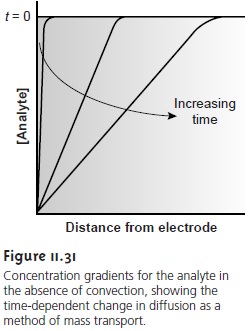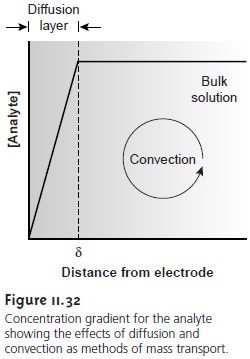Chapter: Modern Analytical Chemistry: Electrochemical Methods of Analysis
Shape of Voltammograms
Shape of Voltammograms
The shape of a voltammogram is determined by several experimental factors, the most important
of which are how the current is measured and whether convection is included as a means of mass transport. Despite an abundance of different voltam- metric techniques, only three
shapes are common for voltammograms (Figure
11.33).



The voltammogram in Figure 11.33a
is characterized by a current
that increases from the
background residual current
to a limiting current at potentials at which
the analyte is oxidized or reduced. Since the magnitude
of a faradaic current is in-
versely proportional to δ (equation 11.33),
a limiting current
implies that the thick-
ness of the diffusion layer remains constant.
The simplest method for obtaining
a limiting current is to stir the solution
(Figure 11.32), which
can be accomplished with a magnetic
stir bar, or by rotating
the electrode. Voltammetric techniques that
include convection by stirring are
called hydrodynamic voltammetry. When
con- vection is absent,
the thickness of the diffusion layer increases with
time (Figure 11.31), resulting in a peak current in place of a limiting
current (Figure 11.33b).
In the voltammograms in Figures 11.33a and 11.33b, the current is monitored as a function of the applied potential. Alternatively, the change in current following a change in potential may be measured. The resulting voltammogram, which is shown in Figure 11.33c, also is characterized by a peak current.
Related Topics